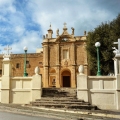 The first article of the Universal Declaration of Human Rights proclaims: “All human beings are born free and equal in dignity and rights. Endowed as they are with reason and conscience, they should act towards one another in a spirit of brotherhood”. This fundamental article establishes the principle of equality and freedom inherent in all individuals, without distinction of any kind. It stresses that each person, by the simple fact of being human, possesses an intrinsic dignity that must be respected. The reference to reason and conscience implies that everyone has the capacity to distinguish right from wrong and to act accordingly, fostering empathy and solidarity among human beings.
The first article of the Universal Declaration of Human Rights proclaims: “All human beings are born free and equal in dignity and rights. Endowed as they are with reason and conscience, they should act towards one another in a spirit of brotherhood”. This fundamental article establishes the principle of equality and freedom inherent in all individuals, without distinction of any kind. It stresses that each person, by the simple fact of being human, possesses an intrinsic dignity that must be respected. The reference to reason and conscience implies that everyone has the capacity to distinguish right from wrong and to act accordingly, fostering empathy and solidarity among human beings.
This article not only establishes an ethical ideal, but also serves as the basis for the rights and freedoms detailed in the rest of the Declaration. By affirming equality and freedom, it rejects any form of discrimination or subordination. The exhortation to behave fraternally highlights the need for just and caring social relations, essential for peaceful coexistence and global cooperation. In summary, the first article summarizes the universal principles of dignity, equality and fraternity, fundamental for the respect and protection of human rights throughout the world.
The plaque with Article 1 of the Universal Declaration of Human Rights is located on the outside wall of the Dolores Medio Public School in Oviedo.
- Address
Colegio Dolores Medio. Calle La Luna 4, 33001, Oviedo, Asturias, Spain - Web
https://ishrights.org/ - Visiting Hours
Always open - What to see
1st article




